In a surprise move, New York Governor Kathy Hochul defended her decision to block a plan to implement congestion pricing in New York City, which would have raised funds for the city’s subway system and reduced traffic in Manhattan. Hochul cited economic concerns and conversations with New Yorkers as the main factors behind her decision. She mentioned raising taxes on businesses as a potential alternative to the toll revenue, but the proposal faced criticism and was eventually rejected by lawmakers. The sudden halt to the program, which was signed into law in 2019, has raised questions about how the necessary funds for subway upgrades will be replaced.
The congestion pricing plan was set to begin on June 30 and was expected to generate around $1 billion annually, funding $15 billion in capital projects for the Metropolitan Transportation Authority. The program had received support from transit and environmental advocates who saw it as a way to improve public transit and air quality in the city. The MTA had already invested significant resources into implementing the tolling infrastructure, including cameras, sensors, and license plate readers. However, Hochul’s decision to pause the program has left the future funding of these projects uncertain.
During a news conference, Hochul emphasized her commitment to ensuring that the subway upgrades are properly funded but provided few details on how she plans to replace the revenue from congestion pricing. She defended her authority to halt the program without MTA board approval, stating that the pause was not a termination of the plan. However, some board members expressed confusion about how certain projects would be funded without the toll revenue. Hochul insisted that her decision was not made lightly and that she had given it careful consideration.
The sudden reversal on congestion pricing has sparked criticism from lawmakers and advocates who argue that halting the program at the last minute is irresponsible and goes against principles of good governance. State lawmakers are set to end their legislative session, and it is unclear if they will take up legislation to replace the lost revenue. The uncertainty surrounding the future of the congestion pricing plan has raised concerns about the funding of crucial subway upgrades in New York City. Hochul did not provide a timeline for potentially reinstating the program, leaving many questions unanswered about the fate of the city’s transportation infrastructure.
Overall, Hochul’s decision to halt congestion pricing in New York City has created uncertainty about the future funding of subway upgrades and raised questions about the governor’s rationale for pausing the program. Advocates and lawmakers have expressed concerns about the impact of higher taxes on businesses and the city’s ongoing recovery from the COVID-19 pandemic. With the legislative session coming to a close, the fate of the congestion pricing plan remains uncertain, leaving the future of the city’s transportation infrastructure in limbo. Hochul’s commitment to properly funding subway projects will be closely watched in the coming days as stakeholders seek clarity on how the necessary funds will be secured.


